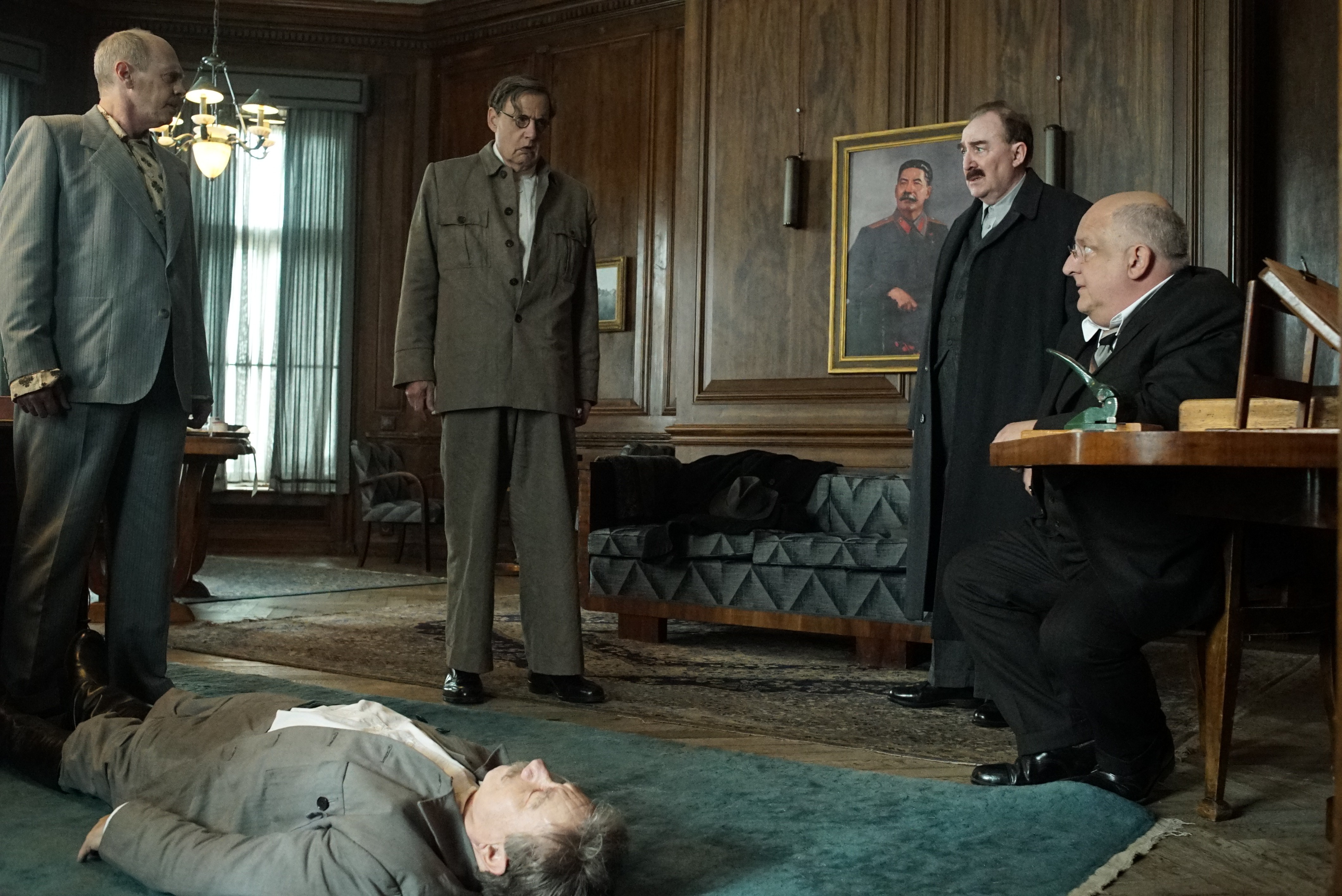We’ve seen enough movies about dictators or powerful people throughout history. But what about when that charismatic leader goes away, and leaves a power void? Those stories are sometimes more interesting, as is the case with The Death of Stalin. Watching his inner circle navigate the immediate aftermath of the passing of their famous leader is about as darkly funny and scathing of a comedy I have seen, and even comes close to the greatest satire of all time, Dr. Strangelove. Well deserved high praise for the guy who also created Veep.
Even though Josef Stalin (Adrian McLoughlin) is firmly in power, he doesn’t quite realize his days are coming to an end. His death prompts Stalin’s “council” to determine who ends up in power. Georgy Malenkov (Jeffrey Tambor) is the clear front runner, but everyone on the council knows that guy has zero spine and ambition. Vyacheslav Molotov (Michael Palin) was going to be “on a list” as well, so he’s out, meaning the struggle comes from two sides: Nikita Khrushchev (Steve Buscemi) and Lavrenti Beria (Simon Russell Beale). The two of them then find ways to push their agendas around the pushovers as well as overtly appear sympathetic to Stalin’s kids Svetlana (Andrea Riseborough) and Vasily (Rupert Friend) so one of them can fill the vacuum left behind by their glorified friend and leader.
The success of a great political satire is how close the movie can flirt with the taste line without overstepping it to the point of unwatchable or distasteful viewing. Armando Iannucci is a pro at this. The Death of Stalin goes one part over the line followed by two parts silly subtle scenes of people tiptoeing around powerful people. An example: there’s an amazing scene where a firing line is stopped in the middle of execution because of new orders so the soon to be dead just walk away: that’s horrifyingly, darkly amusing! So those scenes get followed up with Khrushchev picking out linens at Stalin’s funeral procession or an exhausted orchestra owner (Paddy Considine) frantically trying to rush in a pajama dressed conductor because he thinks Stalin wants a recording of the music and he forgot to do so. The use of wide ranging darknesses of satire also fill in the overall purpose of the film, which is to skewer how abuse of heavy power leads to crazy behavior by the powerless to try to make them happy. It does get exhausting by the end, by the movie cycles through this 2×1 formula for not dark then dark satire to great effect, feeling like you get a great understanding of what happens when a huge power void is created.
Iannucci elects to tell this story from everyone using their normal language an accent: Jason Isaacs uses a British accent, Buscemi American. While this hurts the movie’s authenticity a bit, it certainly helps immensely in getting the points across among the leads. Iannucci knows his primary audience is Western Europe and America, so he tailors the comedy to their version of comic timing, using the actors talents to play off each other, with each one delivering some killer laughs. Buscemi is great navigating the serious and comedic elements of Khrushchev, especially his last scene with the Stalin kids. Simon Russell Beale is equally as good as Buscemi, though his role is much more sinister and straight. Michael Palin hasn’t lost a step in his old age, giving Molotov this endearing idiocy that only a Python could pull off; oh wait, a Bluth could do that too, with Jeffrey Tambor perfectly encapsulating Malenkov’s futility and sweetness amidst the coup he doesn’t realize is happening around him. Andrea Riseborough is quite funny as Svetlana Stalin, calling out obvious attempts at placation to her character but not realizing how her position is about to fall, but Rupert Friend is a scene stealer, making crazy laughs being the basket case of the Stalin family. Also hamming it up is Jason Isaacs, who saunters into the movie content in his power and just laying waste to the whiners in Moscow. The collective is even better than the talent: watching them discuss policy with “unanimous” approval or how to act at Stalin’s funeral or around his dying body is incisive and so much fun. Then they take that playful conversation and apply it to how to spin 1500 people being killed against each other as if that’s a normal thing, equally horrifying and amusing you at the same time. The Death of Stalin’s bold choices also align closely with Iannucci’s casting of talent over authenticity, and it’s hard to blame him with the results he achieves.
I’ve been of the belief that the great comedies “punch up,” meaning they mock people in positions of power. Armando Iannucci clearly believes this too, seeing as how this film is so divisive for the powers that be in Russia that it is banned there. However, the Russian government doesn’t realize that by banning his film, Iannucci has already won, since the government is giving his film power through its fear of The Death of Stalin’s distribution. What better way to get your message out there. Long live Iannucci!

